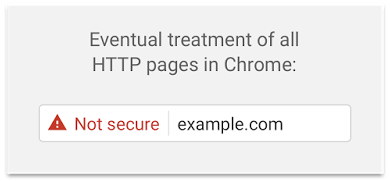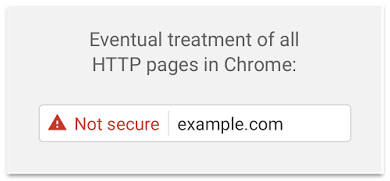With the upcoming October update of Google’s popular Chrome browser, there will be a major change in the way sites without a secure certificate (SSL/TLS) are treated. New security warnings will be added to pages collecting user data over http and all http pages viewed in incognito mode.
Google’s Commitment to HTTPS
For those that may not know, SSL certificates secure the communications between a browser and website user. This is highlighted in web browser address bars, generally through a green padlock and the visible “https” at the start of the URL.
Google has long recommended webmasters move to https, and back in 2016 made their intentions clear by stating, “Eventually, we plan to label all HTTP pages as non-secure, and change the HTTP security indicator to the red triangle that we use for broken HTTPS.”

Google is moving this agenda forward with the October 2017 Chrome (version 62) release by adding “NOT SECURE” warnings on pages with text inputs. This includes pages with contact forms, a common feature of most law firm websites. Warnings have been going out directly from Google regarding this change via their Search Console. Below is an example of such a warning.

Now is the Time to Secure Your Site
While Google has been pushing for https for a while now, we strongly feel this news represents a tipping point. Because of this, all attorney sites should now be secured via an SSL certificate. Lead generation is a primary objective of many attorney sites, and these warnings are anticipated to have a serious, negative impact on a non-secured site’s ability to collect leads via forms. Google has made their intentions clear regarding https: now is the time to update.
Fortunately, there are additional benefits to adding a secure certificate to your site. The most obvious of these benefits is the securing of communications between your website and site visitor. You will also have the green padlock and “Secure” message noted next to your website’s URL, which can increase visitor trust and ultimately aid in conversion. Google has also identified https as a ranking factor, which means secured sites can see an increase in their organic search engine rankings.
Our clients will soon be receiving more information on upgrading to https, but if you have any questions, please feel free to contact us at 877-269-0076.

